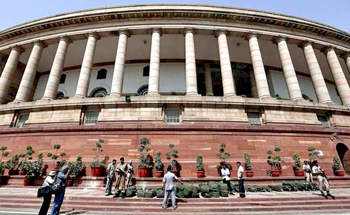New Delhi, Aug 3: Hoping to end the deadlock in Parliament, the Bharatiya Janata Party (BJP) has called for an all-party meeting on Monday after the Congress chose to skip the meet called last week.

The sharp attacks from both the ruling BJP and the opposition Congress party were witnessed on the eve of the all-party meet called by Parliamentary Affairs Minister M Venkaiah Naidu in an effort to end the parliamentary stalemate during the ongoing Monsoon Session.
Monday`s meeting is intended to break the parliamentary deadlock of last two weeks over former IPL chief Lalit Modi issue and the Vyapam scam, which have led to repeated adjournments of the two houses since the ongoing session began on July 22.
Congress leader Anand Sharma, who had earlier said that the party wanted tangible proposition from the government ahead of the meeting, on Sunday said the Bharatiya Janata Party (BJP)-led government was not serious in breaking the stalemate.
Speaking in Hyderabad, Naidu hoped Monday`s all-party meet would be fruitful.
"Tomorrow (Monday), I have called an all-party meeting and hope the meeting will be fruitful and we will be able to resolve the issues and move forward," he said.
"I appeal to the Congress -- Please do not hurt the interests of the country. Let us not indulge in a blame game," Naidu said.
Congress and some other opposition parties are demanding resignations of External Affairs Minister Sushma Swaraj and Rajasthan Chief Minister Vasundhara Raje over their alleged help to former IPL chief Lalit Modi and Madhya Pradesh Chief Minister Shivraj Singh Chouhan over the Vyapam scam.
Lalit Modi is facing investigations from the Enforcement Directorate.
Maintaining that no minister had "done anything wrong, nothing illegal or immoral", Naidu said the central government was ready to discuss any issue.
Jaitley, in a Facebook post on Sunday, held the Congress responsible for disrupting parliament and said "its obstructionist tendencies inflict an economic injury on the country".
Jaitley made a point-wise rebuttal of the Congress`s dissent note to the Rajya Sabha Select Committee on Goods and Services Tax bill.
"Since parliament is not functioning and there is no way to clarify these points before the same, I am constrained to place the above facts in public domain," the finance minister wrote in the post titled "Dissent or Disruption - The Congress Party`s Position on GST".
"Should its (Congress) obstructionist tendencies inflict an economic injury on the country," he asked.
In a press conference, Minister of State for Commerce and BJP leader Nirmala Sitharaman accused the Congress of being "confused and afraid", saying Congress president Sonia Gandhi would have to take the blame if the session was washed out.
"The position of the Congress keeps changing. They are confused and want every debate outside parliament. The confusion created by the Congress is prevailing and people of India (are) being denied a meaningful parliament session," she said.
She said the Congress was scared of the good performance witnessed during the previous parliament session (Budget session) when productivity of both the parliamentary houses was recorded above 100 percent.
Congress leader Anand Sharma later hit back at the BJP, saying the party and Jaitley should not give "patronising" sermons to the Congress "but should collectively reflect and apologise for their own conduct while in opposition".
"The unwarranted, uncharitable and provocative statement made by Finance Minister Arun Jaitley and the BJP accusing the Congress of disruption makes it abundantly clear that the government is neither serious nor sincere in breaking the stalemate for parliament to function," he said.
"The blame for parliament not functioning lies squarely with the prime minister for his arrogance and obduracy," Sharma said.
He said the credit for the parliament work over the past year goes to the responsible and mature opposition.
Sharma said it is the responsibility of the Congress and the opposition parties to expose the "hypocrisy, double speak and double standard on propriety, probity and accountability".





Comments
Add new comment